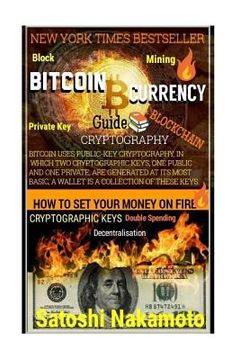Bitcoin Currency Guide: How To Set Your Money On Fire.: CRYPTOGRAPHY GUIDE: Blocks, Private Key, Blockchains, Decentralization, Bitcoin, Crypt
Reseña del libro "Bitcoin Currency Guide: How To Set Your Money On Fire.: CRYPTOGRAPHY GUIDE: Blocks, Private Key, Blockchains, Decentralization, Bitcoin, Crypt"
Bitcoin is a digital currency, meaning it's money controlled and stored entirely by computers spread across the internet, and this money is finding its way to more and more people and businesses around the world. But it's much more than that, and many people -- including the sharpest of internet pioneers as well as seasoned economists -- are still struggling to come to terms with its many identities. With that in mind, we give you this: an idiot's guide to bitcoin. And there's no shame in reading. Nowadays, as bitcoin is just beginning to show what it's capable of, we're all neophytes. Bitcoin isn't just a currency, like dollars or euros or yen. It's a way of making payments, like PayPal or the Visa credit card network. It lets you hold money, but it also lets you spend it and trade it and move it from place to place, almost as cheaply and easily as you'd send an email. As the press so often points out, Bitcoin lets you do all this without revealing your identity, a phenomenon that drove its use on The Silk Road, an online marketplace for illegal drugs. But at the same time, it's a system that operates completely in the public view. All Bitcoin transactions are recorded online for anyone to see, lending a certain transparency to the system, a transparency that can drive a new trust in the economy and subvert the anonymity sought by those on The Silk Road, which the feds shut down last month. Bitcoin is much more than a money service for illegal operations. It's a re-imagining of international finance, something that breaks down barriers between countries and frees currency from the control of federal governments. Bitcoin is controlled by open source software that operates according to the laws of mathematics -- and by the people who collectively oversee this software. The software runs on thousands of machines across the globe, but it can be changed. It's just that a majority of those overseeing the software must agree to the change. In short, Bitcoin is kind of like the internet, but for money. About five years ago, using the pseudonym Satoshi Nakamoto, an anonymous computer programmer or group of programmers built the Bitcoin software system and released it onto the internet. This was something that was designed to run across a large network of machines -- called bitcoin miners -- and anyone on earth could operate one of these machines. This distributed software seeded the new currency, creating a small number of bitcoins. Basically, bitcoins are just long digital addresses and balances, stored in an online ledger called the "blockchain." But the system was also designed so that the currency would slowly expand, and so that people would be encouraged to operate bitcoin miners and keep the system itself growing. When the system creates new bitcoins, you see, it gives them to the miners. Miners keep track of all the bitcoin transactions and add them to the blockchain ledger, and in exchange, they get the privilege of, every so often, awarding themselves a few extra bitcoins. Right now, 25 bitcoins are paid out to the world's miners about six times per hour, but that rate changes over time. Why do these bitcoins have value? It's pretty simple. They've evolved into something that a lot of people want -- like a dollar or a yen or the cowry shells swapped for goods on the coast of Africa over 3,000 years ago -- and they're in limited supply. Though the system continues to crank out bitcoins, this will stop when it reaches 21 million, which was designed to happen in about the year 2140. The idea was to create a currency whose value couldn't be watered down by some central authority, like the Federal Reserve. The good news is that the public nature of the bitcoin ledger may make it theoretically possible to figure out who has stolen your bitcoins. You can always see the address that they were shipped off to, and if you ever link that address to a specific person, then you've found your thief.

